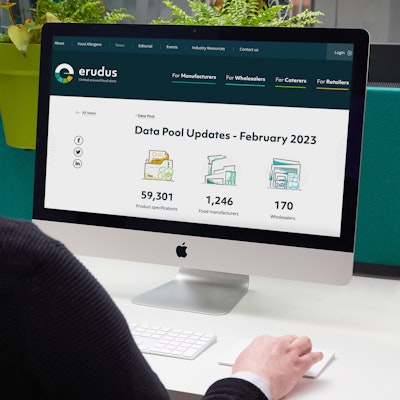Why the industry needs a Data Pool Part 3: What are the main challenges to achieving an industry wide Data Pool?

For some time now there’s been talk of the need for a single, centralised Data Pool used by the whole food industry. And with new legislation on the horizon, and changing business needs within the sector post COVID-19 those voices are getting louder. Here at Erudus not only do we agree with these calls, we believe that we are the solution.
This is our series of bitesize instalments explaining why that is true, and how a government-mandated single Data Pool could improve life for absolutely everyone.
In Part 1 we explored what exactly a Data Pool is, and looked at how Erudus is a Data Pool tailored precisely for the food industry. You can read it here.
Part 2 saw us delve deeper into who a food industry Data Pool would benefit and why. Read that one here.
This time we’re looking closer at the challenges of instigating an industry-wide Data Pool...
A Data Pool is a great idea, but not without its obstacles. It poses a number of key hurdles that would need to be overcome to make it a reality. Here are what we believe to be the key challenges:
Scale
A centralised Data Pool is really only an industry solution if the whole industry is using it. As such, there must be sufficient input and demand from both sides. It’s essentially a chicken and egg situation - Wholesalers won’t use it unless there are enough Manufacturers uploading product information and range coverage, and Manufacturers won’t want to upload anything unless enough Wholesalers are using the Data Pool to ensure the venture is of a scale big enough to release value.

This leaves Caterers - who would really benefit from the accuracy of a centralised Data Pool - out in the cold. The sheer size of the food industry therefore presents a huge challenge in pulling this off.
Commitment

In any evolving and competitive industry there’s often little room for patience. Unfortunately, for a centralised Data Pool the value is in the long-term and not the short-term. It needs to be given time to gain scale and progressively add value. Especially in times like these, businesses look for quick fixes, but for this to work everyone needs to stay the course. A senior buy-in, with businesses committing to the cause, implementing the process changes required is imperative for success.
The food industry needs to buy into the vision of a centralised Data Pool and the vision it unlocks.
Agreement
A major challenge is getting stakeholders to see eye to eye on the specifics of what information the Data Pool should hold, to striking an agreement that regulates standard sets without organisations having to sacrifice any of their competitive edge.
Various parties involved with the Data Pool might have differing opinions on the specifics of the information stored and how it should be calculated, but in order for it to thrive an agreement does need to be struck. Some uncomfortable questions about the way things are done might be raised but it is only by taking a stark look at processes and making decisions that work for everyone that an industry solution will be achieved.

Education

The whole industry needs to be using a centralised Data Pool for it to truly fulfil its potential. Persuading the industry to sign up requires education on a mass scale of what the Data Pool can unlock for them, as well as the value of the role they will play in the bigger picture, where the data is coming from, where it will be getting used - restaurants, takeaways, hospitals, care homes and schools, and the areas in which it will aid them - recipe planning, e-commerce, logistics.
Additionally, many businesses still need to be educated on the importance of the digital transformation happening around them and how it will shape the future of the industry - a Data Pool can be an integral part of that transformation but it is an area that is unfamiliar and daunting to some.
Barriers to entry
There is no one size fits all in the food industry - it is made up of global brands, start-ups and everything in between.
A major hurdle for a Data Pool is ensuring that it’s equally easy to access and use effectively for all these different sized businesses, with all their differently scaled processes and ways of working - from portal type data in, to fully automated API integrations.

One area in which this is particularly challenging is cost. Cost cannot be a barrier to entry of a centralised Data Pool, and as such it must charge its users a price that is realistic and manageable for everyone who needs to use it, but it also must generate enough revenue for it to be able to continue to innovate and develop and improve in line with the ever-increasing and changing demands of the industry. The cost must be perfectly balanced.
Got time to read our story covering everything from Part 1, 2, 3 and more? Our in-depth look into why the food industry needs a Data Pool here.
You may also be interested in…


You may also be interested in…
Why the industry needs a Data Pool Part 2: Who does a centralised Data Pool benefit?
ReadYou may also be interested in…


You may also be interested in…

